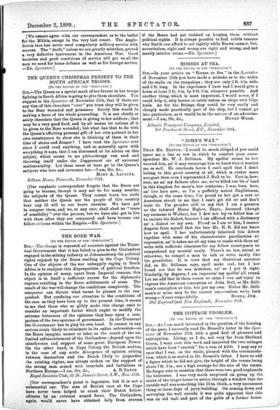THE BOER WAR.
[To THE EDITOR OF THE "SPECTATOR."] SIE,—The charge is repeated ad nauseam against the Trans- vaal Government that it has failed to give to the Outlanders engaged in the mining industry at Johannesburg the political rights enjoyed by the Boers residing in the Cape Colony. One of the objects of the war unhappily raging in South Africa is to readjust this disproportion of political freedom. In the opinion of many, apart from Imperial reasons, this object is in itself a sufficient excuse for the diplomatic rupture resulting in the fierce arbitrament of arms. The result of the war will change the conditions completely. The conqueror can dictate what terms he pleases to the van- quished. But confining our attention to the conditions of the case as they have been up to the present time, it seems to me that those who so glibly make this charge omit to consider an important factor which ought to modify the extreme bitterness of the opinions they base upon a com- parison of the two systems of government. In the Transvaal the Government has to play its own hand. It cannot in any serious crisis likely to culminate in its entire subversion—as the Boers imagine, sooner or later, as the result of the un- limited enfranchisement of the Outlanders—depend upon the interference and support of some great European Power. On the other hand, in Cape Colony the British section, in the case of any acute divergence of opinion arising between themselves and the Dutch likely to jeopardise the existing regime, can always reckon on the support of the strong man armed with ironclads and battalions in Northern Europe.—I am, Sir, Sze., A. B. SAYCE.
Royal Societies Club, GS St. James's Street, S. W., Nov. 25th.
[Our correspondent's point is ingenious, but it is not a substantial one. The men of British race at the Cape
have never been helped to crush their Dutch fellow- citizens by an external armed force. The Outlanders, again, would never have obtained help from oversee if the Boers had not insisted on keeping them without political rights. It in always possible to find subtle reasons why Smith can afford to act rightly while Brown cannot, but, nevertheless, right and wrong are right and wrong, and not merely relative terms.—En. Spectator.]






















































 Previous page
Previous page